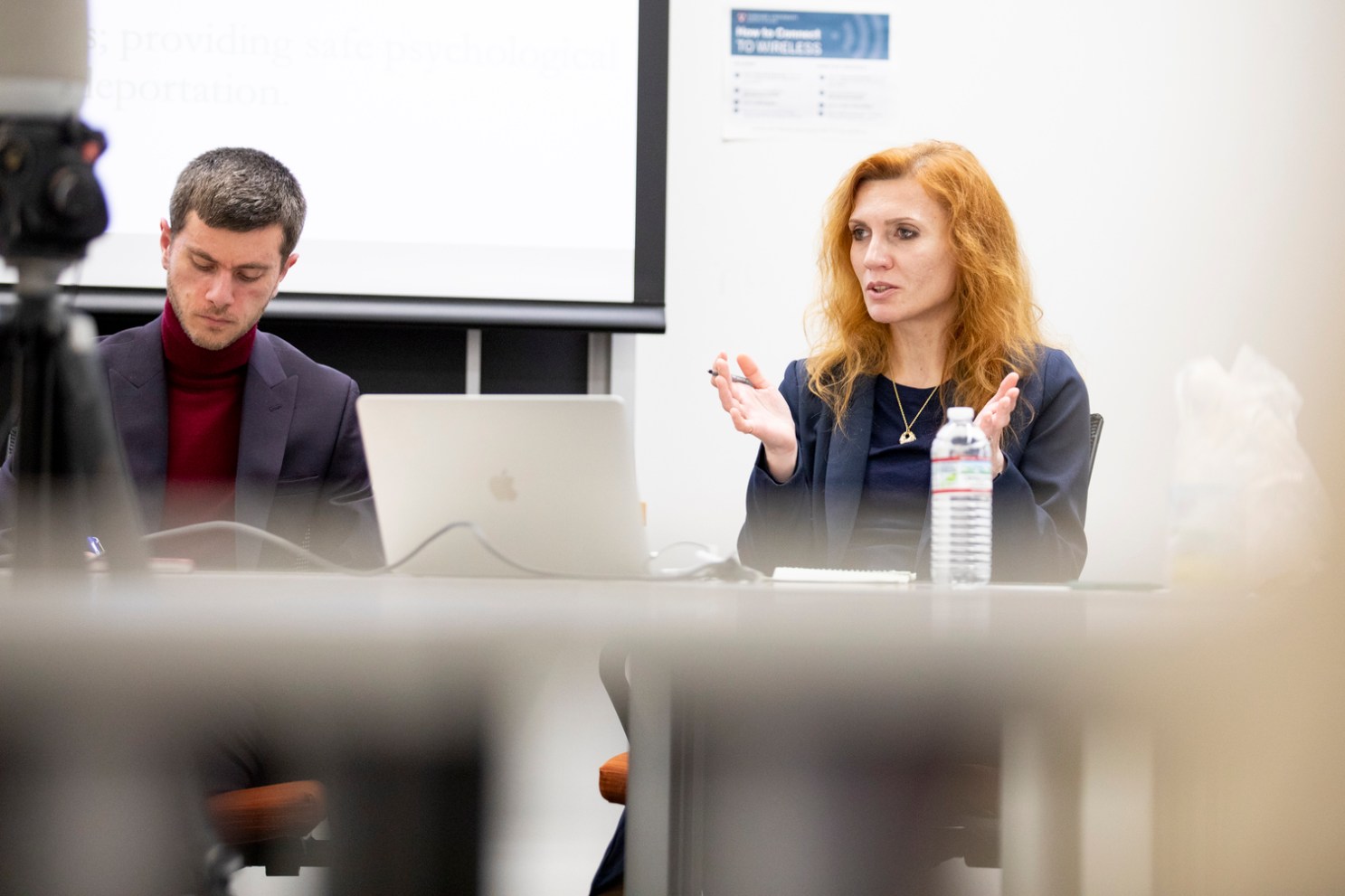Davis Center panelists discuss cultural memory in Ukraine after years of Russian denial

Nataliya Shpylova-Saeed (right), preceptor in Slavic Languages & Literatures, and Bohdan Tokarskyi, assistant professor of Ukrainian literature and culture, at a panel at the Davis Center for Russian and Eurasian Studies in April.
Veasey Conway/Harvard Staff Photographer
In the 1920s, Volodymyr Vynnychenko had just arrived in France when a police representative, handing the Ukrainian writer his right-of-residence papers, stated that Ukraine “n’existe pas” in the eyes of Europe.
His nationality would instead be registered as Russian.
“That was the moment when he realized — and he put it in his letters — that the entire nation was eliminated by a decision of one of the officials,” Nataliya Shpylova-Saeed, preceptor in Slavic Languages & Literatures, recently told an audience at the Davis Center for Russian and Eurasian Studies.
In a panel discussion co-hosted last month by the Ukrainian Research Institute and the Department of Slavic Languages and Literatures, Shpylova-Saeed discussed her 2024 release, “Russia’s Denial of Ukraine: Letters and Contested Memory.”
The book analyzes the gradual and long-lasting integration of contested memory into the cultural memory of Ukraine, and how Ukrainians’ identity has been shaped by Russia’s denial of the country’s sovereignty and independence. Shpylova-Saeed accomplishes this by examining personal letters from Ukrainian writers like Vynnychenko, Mykola Hohol, and Taras Shevchenko for insight into how they understood and articulated their own national identities.
“I wanted to analyze how this pursuit to eliminate Ukrainians as a nation shaped the way Ukrainians remember themselves as a nation,” Shpylova-Saeed said. “I was interested in how we think about the past, and what the past can tell us about how we see ourselves as a nation, but also as an individual.”
Shpylova-Saeed defines contested memory as emerging when two or more groups hold conflicting interpretations of historical events that cannot be simultaneously acknowledged. In the case of Ukraine this contestation reaches an extreme form, Shpylova-Saeed said: denial of the nation’s recognition and sovereignty.
The preceptor said the writers’ letters provided her with “raw” and less-censored insights into how they viewed themselves and talked about their own identities or nationalities. Some writers like Mykola Hohol (aka Nikolai Gogol) did not have a clear answer about their own complex identities. Others like Taras Shevchenko, who referred to Moscow as a “foreign land,” or Lesia Ukrainka — who wrote “I’m Ukrainian!” — were more clear.
“Letters also provided the space where Ukrainian language could be kept and preserved, particularly when the bans were in place,” she said. “That was one of the ways in which Ukrainians kept not only using the Ukrainian language, but also developing the Ukrainian language because the public space became quite unavailable for the usage of the Ukrainian language.”
Joining Shpylova-Saeed for the occasion was George Grabowicz, Dmytro Cyzevs’kyj Professor of Ukrainian Literature Emeritus. He provided historical context on Russia’s long-standing denial of Ukraine, noting that Russian leaders were opposing Ukrainian-language publications as early as the 1600s. He suggested that one way to understand Russia’s current war on Ukraine is as a renewed effort to revive 19th-century Russification strategies implemented under Nicholas I.
“The last front of the contestation of memory is on the battlefield,” Grabowicz said. “It is existential, it is the very way we do business, the way we talk about literature. Canon-formation is both a dialogue and a discourse, but it can also end up on the battlefield.”
Also participating in the talk was Bohdan Tokarskyi, assistant professor of Ukrainian Literature and Culture. Tokarskyi said the examples of manipulation of collective memory in the 20th century take the form of both physical obliteration of people as well as cleansing that targets linguistic and cultural identity.
“The examples of the marginalization, distortion, erasure, and all the different other manipulations of memory are just too many for me to mention here, as someone who specializes on the 1920s and ’30s writing on Ukrainian modernism,” Tokarskyi said, “the period of the Great Terror, the period of the famine, the periods of the murder en masse of hundreds of Ukrainian cultural figures, and of course the periods of the 1960s and ’70s work of dissidents and the pressures against them.”
In Shpylova-Saeed’s view, studying contested memory, a vehicle for wielding both power and resistance, can help with understanding the people of Ukraine’s current struggle against Russia’s invasion.
“In 2022, the international community believed that Ukraine would collapse within three days or just a couple of weeks, but it didn’t happen,” she said. “Ukrainians already developed this kind of persistent resistance against Russia’s dominance but also had a very deeply-rooted spirit of fight for not only their sovereignty and independence, but their sheer existence.”




